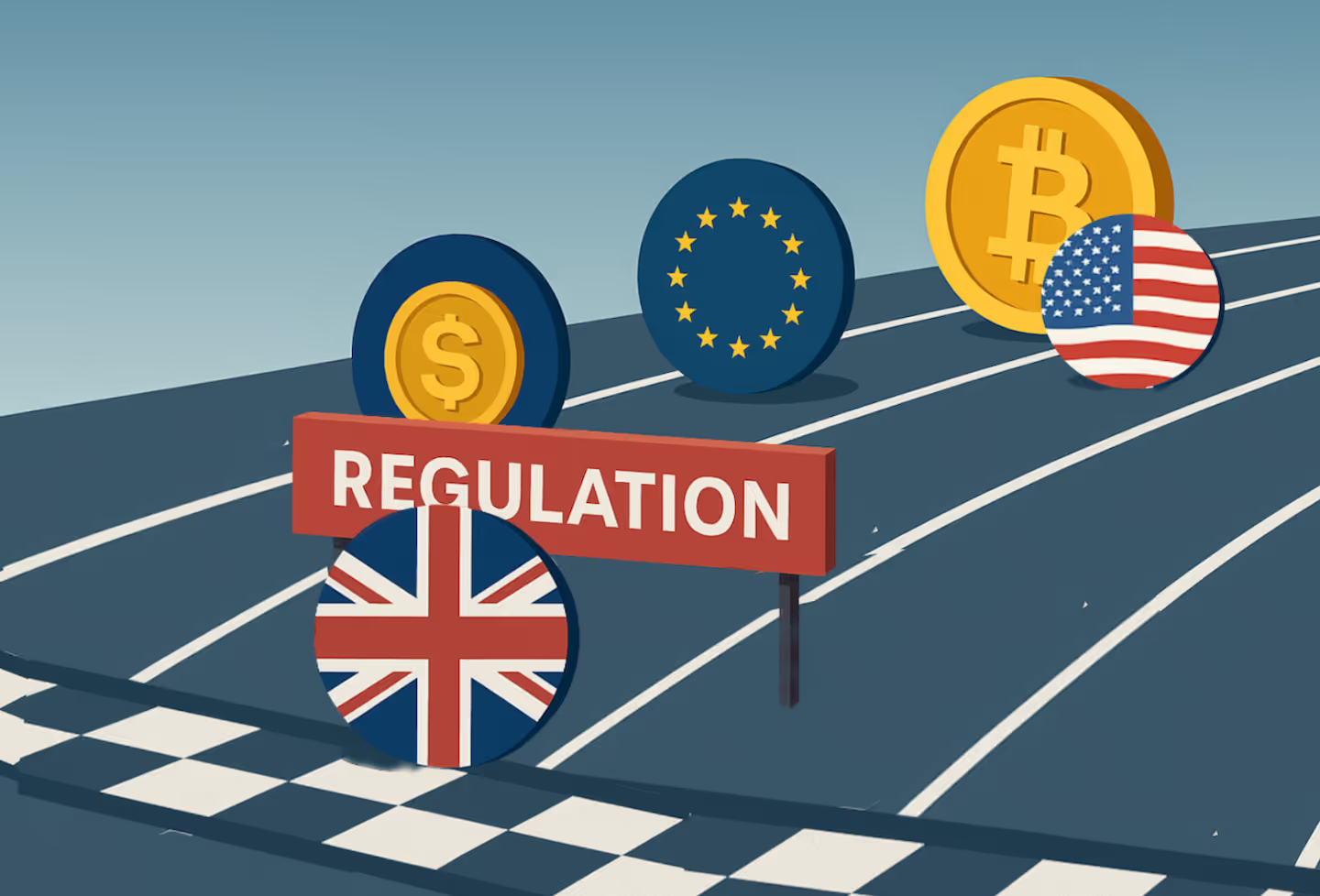The UK’s Crypto Crossroads
UK retail faces hurdles in crypto access while US and EU surge ahead.
The UK has long been a global financial powerhouse — home to global capital markets, world-class financial services, and a thriving fintech sector. The Financial Conduct Authority (FCA) was also a pioneer in crypto regulation, being one of the first to set out a clear framework for non-retail investors. But when it comes to retail access, the country faces a strategic choice: embrace the opportunity and shape the rules of the game, or fall behind as other markets take the lead.
This debate came into sharp focus with recent remarks from former Chancellor George Osborne, who warned that UK retail investors face disproportionate barriers to accessing Bitcoin and other cryptocurrencies — while their US counterparts enjoy far easier access.
The Growing Access Gap
In the UK today, retail investors must navigate:
- Mandatory knowledge tests before making a crypto purchase.
- Cooling-off periods before transactions can be completed.
- Restrictions from major banks blocking transfers to crypto exchanges.
These measures were introduced with the intent to protect consumers from risky, speculative investments. But in practice, they have created a significant friction point for legitimate market participants.
By contrast, US investors recently saw the approval of spot Bitcoin ETFs — a landmark moment that opened up mainstream, regulated access to the world’s largest cryptocurrency.
The result? A widening gap between the UK and US in both market participation and institutional engagement.
Stablecoins: The Second Wave of Digital Assets
If Bitcoin was the first chapter of the crypto story, stablecoins are the second. Pegged to traditional currencies like the US dollar, stablecoins offer the speed and programmability of blockchain with the stability of fiat money.
They are already transforming:
- Cross-border payments — enabling near-instant settlement.
- On-chain capital markets — allowing for new forms of lending and liquidity provision.
- Treasury management — helping businesses manage cash flows and FX exposure in real time.
The US is moving ahead, with legislative proposals and large-scale pilot programs for USD-backed stablecoins. Singapore, Hong Kong, and the EU are also creating clear frameworks.
The UK, however, has been slower to define the rules.
The Cost of Falling Behind
The opportunity Osborne highlights is not simply about positioning the UK as a global hub for crypto innovation — it is about enabling mass-market access. If UK retail investors remain constrained by restrictive measures while their peers in the US and elsewhere gain easier entry points, the UK risks:
- Delaying mainstream adoption of digital assets by households and individual savers.
- Creating a two-tier market where UK retail participants are left on the sidelines while overseas investors benefit from regulated products such as ETFs and stablecoins.
- Fintech talent to global hubs offering a better regulatory environment.
- Capital flows to more innovation-friendly jurisdictions.
For a country seeking to broaden financial participation and reinforce its fintech credentials post-Brexit, this is not just an abstract policy debate. It is a missed chance to ensure that ordinary investors are part of the next chapter in financial innovation — and the risk is that the UK will only catch up once others have already set the pace.
Learning from Other Markets
The UK doesn’t need to reinvent the wheel. Other jurisdictions offer valuable lessons:
- US — enabling regulated retail access via ETFs while exploring stablecoin legislation.
- EU — introducing MiCA (Markets in Crypto-Assets Regulation) to protect customers rights when facing crypto companies.
- Singapore — maintaining strict anti-money laundering oversight while encouraging innovation through sandboxes.
The key takeaway? Regulation and innovation can coexist — but only with a clear, proportionate framework.
Conclusion: A Defining Moment
The next wave of digital finance is already here. Bitcoin ETFs are just the beginning — stablecoins, tokenised assets, and on-chain markets are the real game-changers.
The UK has a choice: shape this future and capture the economic upside, or watch from the sidelines as others set the pace.
Now is the time for decisive action — not just to keep up, but to lead.
Others articles

Opinion
Dilan Bastin on transforming regulatory change into strategic opportunity.

Opinion
Key takeaways from FCA’s DP25/1 and why now is the time for the industry to shape the future

